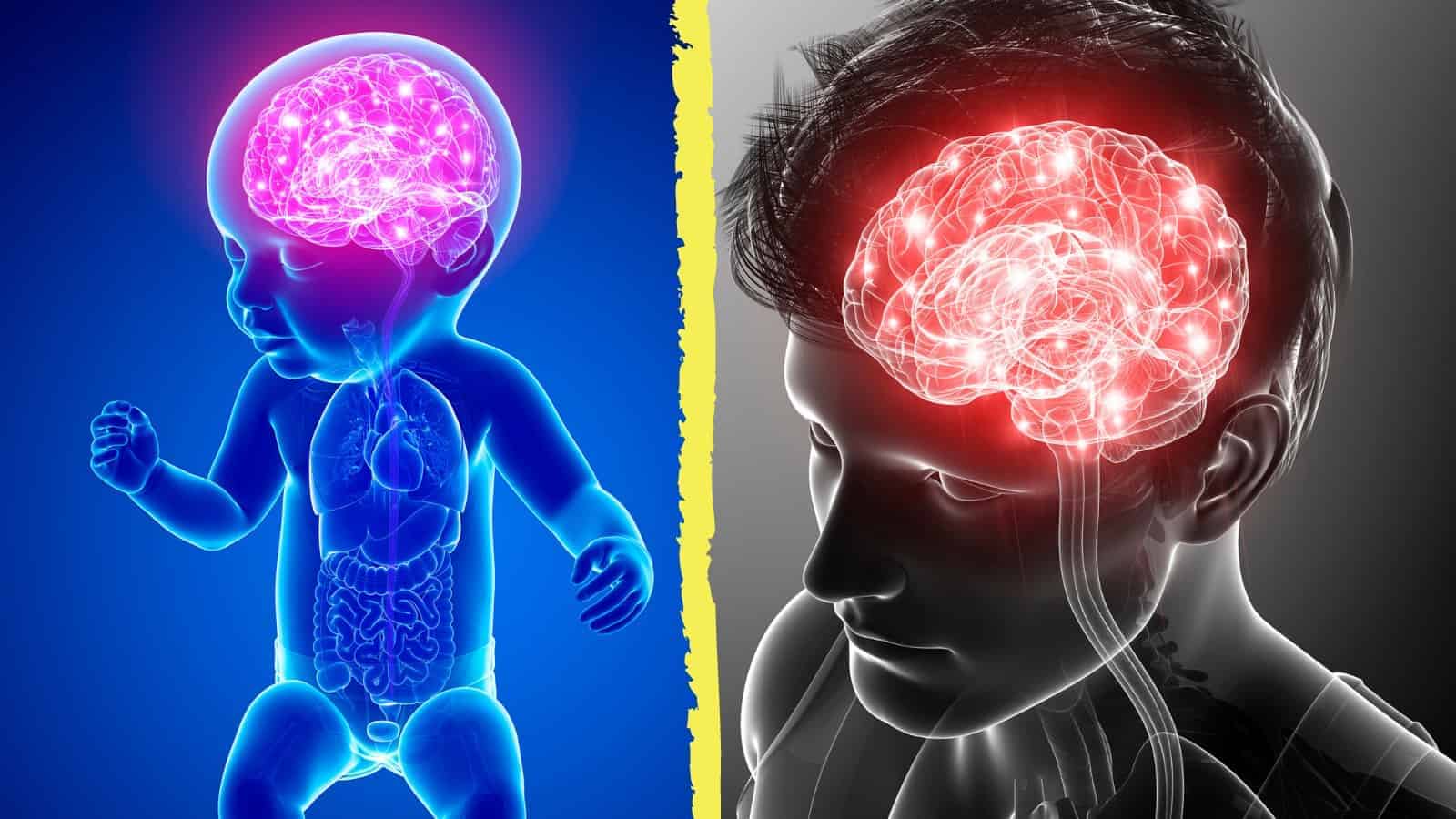“The human brain contains some 100 billion neurons, which together form a network of Internet-like complexity. Christof Koch, chief scientific officer of the Ammen Institute for Brain science, calls the brain the most complex object in the known universe.’” ~ National Public Radio (NPR)
Stages of Brain Development
Our magnificent brain continues to undergo changes throughout its lifetime.
Just four weeks after conception, the neural tube of a baby begins to close. After seven weeks, the very first neurons (chemical & electrical transmitters) and synapses (neuronal connections) start to form the spinal cord and brain.
Between conception and age 2, the brain will add up to 1 million neurons every minute. Fast-forward to age 2, and the brain is roughly 80% the size of an adult’s.
A child’s development is truly something to behold. It’s during these early periods when the youngster is learning the fastest; absorbing and finding meaning to the huge world they find themselves in.
The brain’s potential for growth is so extraordinary that it doesn’t reach full development until around age 22. The cognitive gains, according to scientists, last for approximately 5 more years.
Around and after age 27, memory, processing speed, and working memory begin to slowly decline slowly.
So, what does this process look like?
Truths and Myths of the Aging Brain
Per Emory University’s Alzheimer’s Disease Research Center:
A commonly held misconception is that aging results in an inevitable loss of all cognitive abilities and nothing can be done to halt this decline. Research, however, does not support these claims. While certain areas of thinking do show a normal decline as we age, others remain stable.”
One of the most maddening untruths that have infiltrated society is that our ability to think faces an inevitable downward spiral as we age. (Chalk another one up to media madness. *Sigh*)
The brain’s machinery
While we do lose some of our neurons naturally, the effects on our cognitive abilities are much less severe than what is commonly repeated.
Moreover, evidence suggests that cognitive training can facilitate the growth of neurons and neuronal connections over time. (More on ‘brain training’ later.)
First, let’s discuss the physiological effects of an aging brain. (Bad news, good news, folks!) Usually, these changes are visible to neuroscientists after the age of 60:
– The brain slowly shrinks in volume. This slight yet steady shrinkage occurs in the cerebral cortex, which is responsible for executive functions (movement, mental operations, etc.)
– The white matter of the hippocampus begins to shrink slowly. This is the part of the brain responsible for long-term memory, complex mental activities, and navigation.
The following are the possible cognitive effects:
– Taking action as a result of signaling within the brain (processing speed) slows down.
– Precise coordination and complex movements become more difficult. (Walking and talking on a cell phone, for example.)
– Attention becomes more difficult to sustain; multitasking (which we are already bad at) is more of a burden.
– Ability to learn new material begins to slowly deteriorate.
No More ‘Senior Moments.’
Dr. Michael Merzenich, in his book “Soft-Wired: How the New Science of Brain Plasticity Can Change Your Life,” says that it’s never too late to rewire an aging brain.
Merzenich, a co-inventor of the Cochlear implant and winner of the Kavli Prize in neuroscience, says:
“Your brain is plastic. You have the power within, at any age to be better, more capable, continuously growing a progressively more interesting life. If you’re in decline, you have great resources that can help you sustain – indeed, even regrow – your neurological abilities in ways that can help assure that you active brain shall last as long as your physical body.”
In other words, the commitment to lifelong learning can preserve, protect, and recover cognitive abilities. Dr. Merzenich, by the way, is over 70 years of age – and is still contributing vastly in the arena of brain science.
(Do yourself a favor and watch Dr. Merzinich’s TED talk on brain plasticity. The man is a genius of the highest order.)
Training Your Brain
(We advise you to look for ‘peer-reviewed,’ ‘double-blind’ research studies on brain training providers websites like the ones mentioned in this article. Some organizations claim their methods are ‘proven by science’ when they’re not.)
The pioneer of neuropsychology, Dr. Donald Hebb, said it back in 1949:
“Neurons that fire together, wire together.”
Hebb meant that connections between two neurons might be strengthened if the neurons fire simultaneously. If you’re willing to learn, your brain is ready to grow.
So, what are the best methods of ‘brain training’?
There are a bunch of things you can do, some better than others. Reading material that is somewhat challenging can spur neuronal growth, according to science; as can crossword puzzles and games like Sudoku.
Additionally, there are plenty of free games to play online that can stimulate your gray matter. Some companies offer subscription-based services, though it’s best to do a bit of research about the company’s claims.
In reality, doing something to keep your mind occupied can only benefit your marvelous brain!

















